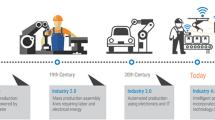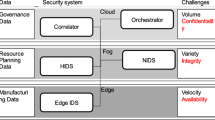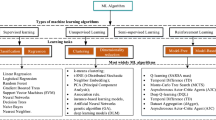Abstract
The planning, scheduling, and control of manufacturing systems can all be viewed as problem-solving activities. In flexible manufacturing systems (FMSs), the computer program carrying out these problem-solving activities must additionally be able to handle the shorter lead time, the flexibility of job routing, the multiprocessing environment, the dynamic changing states, and the versatility of machines. This article presents an artificial intelligence (AI) method to perform manufacturing problem solving. Since the method is driven by manufacturing scenarios represented by symbolic patterns, it is referred to as pattern-directed. The method is based on three AI techniques. The first is the pattern-directed inference technique to capture the dynamic nature of FMSs. The second is the nonlinear planning technique to construct schedules and assign resources. The third is the inductive learning method to generate the pattern-directed heuristics. This article focuses on solving the FMS scheduling problem.
In addition, this article reports the computation results to evaluate the utility of various heuristic functions, to identify important design parameters, and to analyze the resulting computational performance in using the pattern-directed approach for manufacturing problem-solving tasks such as scheduling.
Similar content being viewed by others
References
BakerK.R., Introduction to Sequencing and Scheduling, John Wiley & Sons, New York (1974).
Buzacott, J.A., “Optimal Operating Rules for Automated Manufacturing Systems”, IEEE Transactions on Automatic Control (February 1982).
BuzacottJ.A. and YaoD., “Flexible Manufacturing Systems: Review of Analytical Models”, Management Science, Vol. 32, No. 7, pp. 890–905 (1986).
ChapmanD., “Planning for Conjunctive Goals”, Technical Report 802, MIT Artificial Intelligence Laboratory, Cambridge, MA (1986).
ConwayR.W., MaxwellW.L., and MillerL.W., Theory of Scheduling, Addison-Wesley, Cambridge, MA (1967).
Cutkosky, M., Fussell, P., Milligan, R. Jr., “Precision Machining Cells within a Manufacturing System”, Technical Report CMU-RI-TR-84-12 Robotics Institute, Carnegie-Mellon University (1984).
DavisE. and PattersonJ., “A Comparison of Heuristic and Optimum Solutions in Resource-Constrained Project Scheduling”, Management Science, Vol. 21, No. 8, pp. 944–955 (1975).
FikesR.E. and NilssonN.J., “STRIPS: A New Approach to the Application of Theorem Proving to Problem Solving”, Artificial Intelligence, Vol. 2, No. 3/4, pp. 189–208 (1971).
FikesR.E., HartP.E., and NilssonN.J., “Learning and Executing Generalized Robot Plants”, Artificial Intelligence, Vol. 3, No. 4, pp. 251–288 (1972).
Fox, M.S., “Constraint-Directed Search: A Case Study of Job-Shop Scheduling”, Ph.D. Thesis, Technical Report CMU-RI-TR-83-22, Robotics Institute, Carnegie-Mellon University (1983).
Fox, M.S., Allen, B.P., Smith, S.F., and Strohm, G.A., “ISIS: A Constraint-Directed Reasoning Approach to Job Shop Scheduling”, CMU-R1-Tr-83-8, The Robotics Institute, Carnegie-Mellon University (1983).
FrenchS., Sequencing and Scheduling: An Introduction to the Mathematics of the Job-Shop, John Wiley, New York (1982).
GareyM.R., JohnsonD.S. and SethiR., “The Complexity of Flowshop and Jobshop Scheduling”, Mathematics of Operations Research, Vol. 1, pp. 117–129 (1976).
GonzalezT. and SahniS., “Flowshop and Jobshop Schedules: Complexity and Approximation”, Operations Research, Vol. 26, pp. 36–52 (1978).
HartP., NilssonN., and RaphaelB., “A Formal Basis for the Heuristic Determination of Minimum Cost Paths”, IEEE Transactions on System, Man, and Cybernetics, Vo. 4, No. 1, pp. 100–107 (1968).
Hayes-RothR. and WatermanD., “Principles of Pattern-Directed Inference Systems”, in Pattern-Directed Inference Systems, D.Waterman and F.Hayes-Roth (Eds.), Academic Press, New York (1978).
Hutchinson, G.K., “Flexibility is Key to Economic Feasibility to Automating Small Batch Manufacturing”, Industrial Engineering, pp. 77–84 (1984).
JonesA.T. and McLeanC.R., “A Proposed Hierarchical Control Model for Automated Manufacturing Systems”, Journal of Manufacturing Systems, Vol. 5, No. 1, pp. 15–25 (1986).
KimemiaJ. and GershwinS.B., “Flow Optimization in Flexible Manufacturing Systems”, International Journal of Production Research, Vol. 23, No. 1, pp. 81–96 (1985).
KorfR., Learning to Solve Problems by Searching for Macro-Operators, Pitman, Marshfield, MA (1985).
KusiakA., “Scheduling Flexible Machining and Assembly Systems”, in Proceedings of the Second ORSA/TIMS Conference on Flexible Manufacturing Systems, K.Stecke and R.Suri (Eds.), Elsevier Science Publishers B.V., Amsterdam (1986).
LagewegB., LenstraJ., and Rinnooy KanA., “Job-shop Scheduling in Implicit Enumeration”, Management Science, Vol. 24, pp. 441–450 (1972).
LenstraJ.K. and Rinnooy KanA.H.G., “Complexity of Scheduling under Precedence Constraints”, Operations Research, Vol. 26, No. 1, pp. 22–35 (1978).
Lozano-PerezT., “Robot Programming”, Artificial Intelligence Laboratory, AI Memo 698, Massachusetts Institute of Technology, Cambridge, MA (1982).
Merchant, M.E., “Production: A Dynamic Challenge”, IEEE Spectrum, pp. 36–39 (1983).
MichalskiR., CarbonellJ., MitchellT. (Eds.), Machine Learning: An AI Approach, Tioga, Palo Alto, CA (1983).
NewellA. and SimonH., Human Problem Solving, Prentice-Hall, Inc., Englewood Cliffs, NJ (1972).
NewellA. and SimonH., “Computer Science as Empirical Inquiry: Symbols and Search”, Communications of the ACM, Vol. 19, No. 3, pp. 113–126 (1976).
NilssonN., Principles of Artificial Intelligence, Tioga, Palo Alto, CA (1980).
NofS., BarashM., and SolbergJ., “Operational Control of Item Flow in Versatile Manufacturing Systems”, International Journal of Production Research, Vol. 17, No. 5, pp. 479–489 (1979).
Ow, P.S., “Heuristic Knowledge and Search for Scheduling”, unpublished Ph.D. thesis, Graduate School of Industrial Administration, The Robotics Institute, Carnegie-Mellon University, Pittsburgh, PA (1984).
PanwalkarS. and IskanderW., “A Survey of Scheduling Rules”, Operations Research, Vol. 25, pp. 45–61 (1977).
Park, S.C., Raman, N., and Shaw, M. “Applying Inductive Learning to Pattern-Directed Scheduling in FMS”, in preparation.
PearlJ., “Knowledge vs. Search: A Quantitative Analysis using A*”, Artificial Intelligence, Vol. 20, pp. 1–13. (1983)
PednaultE., “Preliminary Report on a Theory of Plan Synthesis” Technical Note 358, SRI International, Menlo Park, CA (1985).
Rachamadugu, R.R., “Myopic Heuristics in Job Shop Scheduling”, Ph.D. Thesis, GSIA, Carnegie-Mellon University (1982).
RankyP., The Design and Operation of Flexible Manufacturing Systems, IFS Publications, North-Holland (1983).
SacerdotiE.D., A Structure for Plans and Behavior, North-Holland, New York (1977).
SchrageL. and BakerK. “Dynamic Programming Solution of Sequencing Problems with Precedence Constraints”, Operations Research, Vol. 26, No. 3, pp. 444–449 (1978).
ShawM.J., “A Pattern-Directed Approach to FMS Scheduling”, in Proceedings of the Second ORSA/TIMS Conference on Flexible Manufacturing Systems, K.Stecke and R.Suri (Eds.), Elsevier Science Publishers B.V., Amsterdam (1986). A longer version appeared in Annals of Operation Research, Vol. 15, pp. 353–376 (1988).
ShawM.J., “Applying Inductive Learning to Enhance Knowledge-Based Expert Systems”, Decision Support Systems, Vol. 3, No. 4, pp. 319–332 (1987).
ShawM.J. “A Knowledge-Based Scheduling Approach for Flexible Manufacturing Systems”, International Journal of Production Research, Vol. 26, No. 5, pp. 821–844 (1988).
Shaw, M.J. and Whinston, A.B., “Automatic Planning and Flexible Scheduling: A Knowledge-Based Approach”, Proceedings of International Conference on Automation and Robotics, St. Louis, MO (1985).
Shaw, M.J. and Whinston, A.B., “Task Bidding, Distributed Planning, and Flexible Manufacturing”, Proceedings ofIEEE Conference on Artificial Intelligence Applications, Miami, FL (1985)
ShawM.J. and WhinstonA.B., “Application of Artificial Intelligence Techniques to Planning and Scheduling”, in Flexible Manufacturing Systems: Methods and Studies, A.Kusiak (Ed.), Amsterdam, North Holland (1986).
ShawM.J. and WhinstonA.B., “A Distributed Knowledge-Based Approach to Flexible Automation: The Contract-Net Framework”, International Journal of Flexible Manufacturing Systems, Vol. 1, No. 1, pp. 85–104 (Sept. 1988).
Shaw, M.J. and Whinston, A.B., “An Artificial Intelligence Approach to the Scheduling of Flexible Manufacturing Systems”, IIE Transactions., No. 2 (1989).
SteckeK.E. and SolbergJ.J., “Loading and Control Policies for a Flexible Manufacturing System”, International Journal of Production Research, Vol. 19, No. 5 pp. 481–490, (September–October 1981).
SteckeK.E., “Formulation and Solution of Nonlinear Integer Production Planning Problems for Flexible Manufacturing Systems”, Management Science, Vol. 29, No. 3, pp. 273–288 (March 1983).
TateA. “Generating Project Networks”, Proceedings of the First International Joint Conference on Artificial Intelligence, Massachusetts Institute of Technology, Cambridge, MA, (August 1977).
VereS. “Planning in Time: Windows and Durations for Activities and Goals”, IEEE Transactions on Pattern Analysis and Machine Intelligence, Vol. PAMI-5, No. 3, pp. 246–266 (1983).
WilkinsD. “Using Patterns and Plans in Chess”, Artificial Intelligence, Vol. 14, No. 2, pp. 165–203 (1980)
WilkinsD., “Domain Independent Planning: Representation and Plan Generation”, Artificial Intelligence, Vol. 22, pp. 269–301 (1984).
Author information
Authors and Affiliations
Rights and permissions
About this article
Cite this article
Shaw, M.J. A pattern-directed approach to flexible manufacturing: A framework for intelligent scheduling, learning, and control. Int J Flex Manuf Syst 2, 121–144 (1989). https://doi.org/10.1007/BF00222707
Issue Date:
DOI: https://doi.org/10.1007/BF00222707




